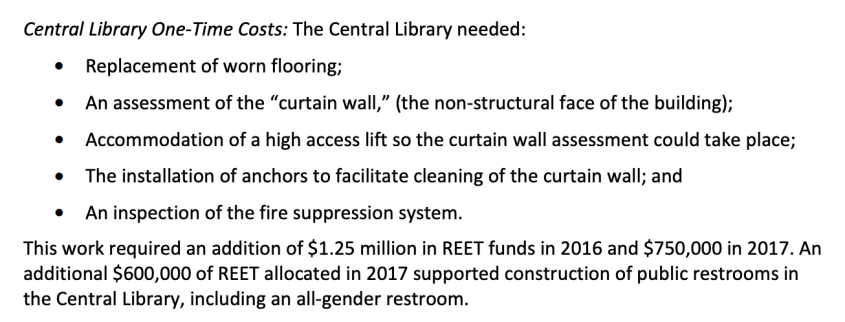City council members discussed Mayor Jenny Durkan’s proposal to renew Seattle’s library levy and increase its size from $123 million to $213 million on Monday, and proposed some possible adds of their own.
The most controversial aspect of the levy, besides its size (which council member Mike O’Brien noted is an increase of about 35 percent once population growth and inflation are accounted for—not 78 percent, as the Seattle Times has claimed) is a proposal to eliminate fines for overdue materials, which studies from other cities have shown is an effective way to ensure access for low-income residents while actually increasing the number of books and other materials that get returned.
Council staffer Asha Venkataraman explained this somewhat counterintuitive conclusion. First, she noted, fines really are a barrier to access: About one in every five library cardholders currently has a blocked account, meaning that they can’t access library materials unless they pay their fines. The areas of the city with the largest numbers of blocked accounts, as well as the highest average outstanding fines, are mostly south of I-90, in Southeast Seattle, plus parts of far north Seattle—areas with lower average incomes and more people of color. Those areas also happen to be the places where wifi and computer usage in libraries is highest (suggesting the lack of computers at home).
Second, Venkataraman explained, a San Francisco study that looked into eliminating library fines found that patrons in cities that had partially or completely eliminated fines returned materials at the same rate or slightly faster, and that circulation increased overall (which makes sense, because when people fail to return books, the number of books in the system is reduced and circulation goes down.) The study also found that a major reason people avoided going in to get their account restored was “the negative interaction of having to go and pay off fines.”
Council president Bruce Harrell expressed concern that eliminating fines might discourage people from doing their civic responsibility, and suggested (perhaps tongue in cheek) that if the city is going to eliminate fines, they should also eliminate fees for people who simply fail to return books, which account for about $200,000 of the $1.1 million the library system takes in annually from fines and fees. (“Some people are operating in a higher theft area than others and I don’t want them being prohibited from being able to borrow from this public asset just because they couldn’t afford to pay the book back,” Harrell said.) Harrell also suggested that the city create a system where people who want to pay can do so, but people who don’t want to pay won’t be penalized. “I don’t understand the policy reasons for waiving millions of dollars when some people might be willing to pay,” Harrell said. The library’s revenues from fines have been steadily declining, thanks largely to the growing use of online materials. Since 2013, fine revenues have decreased by 31 percent.
Council member Kshama Sawant responded that even if payment is “voluntary,” such a system would still require people returning books to indicate that they weren’t going to pay, and why. “What’s going to happen if you introduce that kind of policy … would be a sort of implicit shaming of people who can’t pay,” Sawant said. “There are children who shouldn’t have to figure out whether their parents are able to pay or not. That just seems to put the onus on the individual families to decide what they should do.”
Council members also discussed the question—raised, most recently, in a Seattle Times editorial that argued that the city should find alternative sources to pay for library capital projects—of whether revenues from the real estate excise tax on new development, or REET, could be used to supplant a significant portion of levy funding and lower the levy ask. The Times also claimed, erroneously, that the city has “slashed” REET spending on libraries from $3.8 million in 2016 to “only $564,000 this year.” (Over the life of the proposed levy, annual REET spending would be $500,000 to $800,000 a year, according to a staff analysis.) In fact, the higher spending in 2016 (and 2017) represented a historic anomaly. According to the adopted library budgets from those years, the city spent a total of $2.3 million in REET revenues on library capital projects in 2016, and a total of $1.9 million in 2017, largely to fund unanticipated repairs to the downtown library, including repairs to a sinking floor. Between 2013, when the last version of the levy went into effect, and 2015, average REET spending was $593,000 a year. “Not all library needs will and can be met to the scale that is needed by simply relying on REET,” council member Lorena Gonzalez said.

Council members indicated that they were interested in adding a few items to the plan, including extended weeknight hours (council member O’Brien), programs targeted at kids under 4 (Gonzalez), and adding air conditioning and elevators at the Columbia City, Greenlake, and University branches.
The council will hold its first public hearing on the levy in council chambers starting at 5:30 this Thursday, April 11.


